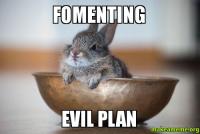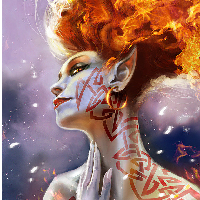×
Please remember that experience is relative. Just because you aren't a completely new author doesn't convey a right to throw around the weight of your experience as if you are Stephen King, Jim Butcher, or Brandon Sanderson. Unless you ARE Stephen King, Jim Butcher, or Brandon Sanderson... in which case, go for it. 
Posting rules: Any registered member can create or reply to a thread.
Posting rules: Any registered member can create or reply to a thread.
Question Some advice from James Hudnall
7 years 9 months ago #1
by Ahimsa
Posts:
73
Gender:
Unknown
Birthdate:
Unknown
sri-bhagavan uvaca | kalo 'smi loka-ksaya-krt pravrddho | lokan samahartum iha pravrttah | - "Lord Krishna said: I am terrible Time, the destroyer of all beings in all worlds, engaged to destroy all beings in this world." - Bhagavad Gita 11:32
- Ahimsa
-
 Topic Author
Topic Author
To those who know him, James D Hudnall is one of the great writers in comics. Personally I remember him most fondly for his work on the Ultraverse, especially Hardcase and The Solution.
Today I came across a nice post by him on his website, with some writing tips.
http://jameshudnall.com/writing/
He has some controversial points, and it seems a little slanted towards comic writing, but I found it a very good resource nonetheless.
He also has a book out called The Secrets of Writing: How To Write Great Fiction , that also looks very interesting.
Today I came across a nice post by him on his website, with some writing tips.
http://jameshudnall.com/writing/
He has some controversial points, and it seems a little slanted towards comic writing, but I found it a very good resource nonetheless.
He also has a book out called The Secrets of Writing: How To Write Great Fiction , that also looks very interesting.
sri-bhagavan uvaca | kalo 'smi loka-ksaya-krt pravrddho | lokan samahartum iha pravrttah | - "Lord Krishna said: I am terrible Time, the destroyer of all beings in all worlds, engaged to destroy all beings in this world." - Bhagavad Gita 11:32
7 years 9 months ago #2
by Katssun
Posts:
1333
Gender:
Unknown
Birthdate:
Unknown
- Katssun
-

Honestly, I felt that the only controversial one was #5. I've heard from a ton of writers (fanfiction, web authors, and professional) that your first impulses are actually better, because they're the inspired parts, and the rewrites are all you second guessing yourself, which are points he picks up further below in the list.
I'd say it is more 80% writing, 20% rewrites, unless you realized you majorly goofed early on with your premise. Then it is maybe 60% / 40%.
The rest is actually all really great advise for aspiring writers.
I'd say it is more 80% writing, 20% rewrites, unless you realized you majorly goofed early on with your premise. Then it is maybe 60% / 40%.
The rest is actually all really great advise for aspiring writers.
7 years 9 months ago #3
by Syenite
Posts:
2
Gender:
Unknown
Birthdate:
Unknown
- Syenite
-

Warning: Spoiler!
[ Click to expand ]
[ Click to hide ]
4. POLITICAL CORRECTNESS IS WRONG.
No one likes political correctness. It’s dishonest. It classifies people into artificial categories and sets them apart in some way. This is a patronizing and subtly discriminatory thing. It is not what it proposes to be. And on top of that, using PC terms dates the work, because anything so criticized and hated will become a joke in time. Already anti-PC comedies are all over the place. Using PC concepts and language will become as silly as “Jive Turkey” sooner or later. On top of that it’s lame. So why do it?
No one likes political correctness. It’s dishonest. It classifies people into artificial categories and sets them apart in some way. This is a patronizing and subtly discriminatory thing. It is not what it proposes to be. And on top of that, using PC terms dates the work, because anything so criticized and hated will become a joke in time. Already anti-PC comedies are all over the place. Using PC concepts and language will become as silly as “Jive Turkey” sooner or later. On top of that it’s lame. So why do it?
7 years 9 months ago #4
by Katssun
Posts:
1333
Gender:
Unknown
Birthdate:
Unknown
- Katssun
-

I agree with that one. Dating your work in any way hurts your efforts. Instead of a piece being timeless, you've gone for the risk of being appreciated for your time period, being offensive to future audiences, or the slim hope of being recognized as a quintessential work that undermined the intolerant views of that time. Your work can't be appreciated for what it is, of its own merit, but only as a social response to a particular issue.
Dating your work for political reasons is actually worse than dating it with normal means. Not correctly predicting smart phones is one thing. Readers generally forgive that. Making a political statement using your work limits your future audience (10+ years, common time frame with Whateley or something like Fictionmania) and that's really the worst of it. Throwing readers out of your work instead of making it timeless can't possibly help you.
Whateley has a defined setting (The United States of 2007 and 2016), reflecting an exaggerated social climate that its authors openly recognize does not quite match our own...for good reasons. Mutants, superheroes, the paranormals, and its effects on society as a result.
You really can't have it both ways. Set a year and reflect it accurately knowing the risks and taking advantage of writing a "period" work, or write a timeless piece.
Dating your work for political reasons is actually worse than dating it with normal means. Not correctly predicting smart phones is one thing. Readers generally forgive that. Making a political statement using your work limits your future audience (10+ years, common time frame with Whateley or something like Fictionmania) and that's really the worst of it. Throwing readers out of your work instead of making it timeless can't possibly help you.
Whateley has a defined setting (The United States of 2007 and 2016), reflecting an exaggerated social climate that its authors openly recognize does not quite match our own...for good reasons. Mutants, superheroes, the paranormals, and its effects on society as a result.
You really can't have it both ways. Set a year and reflect it accurately knowing the risks and taking advantage of writing a "period" work, or write a timeless piece.
7 years 8 months ago #5
by Kristin Darken
Posts:
3898
Gender:
Unknown
Birthdate:
Unknown
Fate guard you and grant you a Light to brighten your Way.
- Kristin Darken
-

No one writes truly timeless pieces. To think you can is just arrogance... or hubris, if you prefer. People talk about how 'Shakespeare' wrote timeless pieces because the elements of them are just as true today as they were in his day. And in that sense, yes... absolutely... Romeo and Juliet is timeless. In the sense that girls and boys can and will fall in love even though they cannot possibly have a realistic, stable relationship due to outside influences... family, politics, gender or sexual orientation, temporal chasms, galactic gulfs, and so on. And because they are kids, they will follow their hearts, make mistakes get hurt and take overly dramatic actions meant to prove they really loved one another ... with disastrous result.
That's timeless. But Romeo and Juliet? Ya... no. Put a group of middle school and high school kids in a theatre house and put on Romeo and Juliet from them in a 'played straight' production. What was written on the page? Not timeless. Even if you update the language, you have to face the fact that it a huge part of the comedy of Shakespeare's works is not gotten by modern audiences. It can't be, because like Saturday Night Live, there were topical references to events happening in the daily lives of Londoners worked into those jokes. There were jokes of pronunciation... which we don't get when we try to speak the language in a modern way for audiences to understand. There are political references. There are references to popular stories - things from the Greeks and so forth. And that's the comedies and fantasies. The histories?! Not timeless at all.
Can we do things to minimize the influence such elements have on our stories? Should we? Yes and no. That really depends on the contract you have with your reader. A reader that expects a story to be grounded in reality can expect or even demand things like timestamps and topical references. Can you imagine doing a Noir mystery/detective story without setting it properly?
That's timeless. But Romeo and Juliet? Ya... no. Put a group of middle school and high school kids in a theatre house and put on Romeo and Juliet from them in a 'played straight' production. What was written on the page? Not timeless. Even if you update the language, you have to face the fact that it a huge part of the comedy of Shakespeare's works is not gotten by modern audiences. It can't be, because like Saturday Night Live, there were topical references to events happening in the daily lives of Londoners worked into those jokes. There were jokes of pronunciation... which we don't get when we try to speak the language in a modern way for audiences to understand. There are political references. There are references to popular stories - things from the Greeks and so forth. And that's the comedies and fantasies. The histories?! Not timeless at all.
Can we do things to minimize the influence such elements have on our stories? Should we? Yes and no. That really depends on the contract you have with your reader. A reader that expects a story to be grounded in reality can expect or even demand things like timestamps and topical references. Can you imagine doing a Noir mystery/detective story without setting it properly?
Fate guard you and grant you a Light to brighten your Way.
7 years 8 months ago #6
by MageOhki
Posts:
548
Gender:
Unknown
Birthdate:
Unknown
- MageOhki
-

As for his point 4, while I agree with "Don't do PC", my reasoning is different.
"People do not read fiction to be lectured or otherwise nagged. They read to be entertained." By inserting PC (gah!) you in effect (even though I don't like the word here, it's fairly accurate) 'trigger' a response, that frankly, means you've failed.
"People do not read fiction to be lectured or otherwise nagged. They read to be entertained." By inserting PC (gah!) you in effect (even though I don't like the word here, it's fairly accurate) 'trigger' a response, that frankly, means you've failed.
7 years 8 months ago #7
by Katssun
Posts:
1333
Gender:
Unknown
Birthdate:
Unknown
- Katssun
-

I'd define timelessness on a scale of suspension of disbelief. That's what any author should be aiming to maintain.
Imagine a work where segregation or apartheid isn't projected into the future or present day as an allegory, but assumed to simply be the set in reality, status quo for the next 50 years. It becomes dated in our present day, even if it is still relevant on some level.
Or even a more mundane example. That a woman should never be allowed to spend the night, innocent as can be...unescorted with a man. How positively scandalous. If it was a period piece, set in the 1950s, it works. But if the author set their story in 2010, filled with fantastical devices and new technologies and space travel, etc., but still left that social convention in place, it would seriously harm modern readers suspension of disbelief, potentially throwing them out of the piece.
Imagine a work where segregation or apartheid isn't projected into the future or present day as an allegory, but assumed to simply be the set in reality, status quo for the next 50 years. It becomes dated in our present day, even if it is still relevant on some level.
Or even a more mundane example. That a woman should never be allowed to spend the night, innocent as can be...unescorted with a man. How positively scandalous. If it was a period piece, set in the 1950s, it works. But if the author set their story in 2010, filled with fantastical devices and new technologies and space travel, etc., but still left that social convention in place, it would seriously harm modern readers suspension of disbelief, potentially throwing them out of the piece.
7 years 8 months ago #8
by Sir Lee
Posts:
3113
Gender:
Male
Birthdate:
08 Nov 1966
- Sir Lee
-

My take on the Political Correctness thing is that it should be a matter of characterization.
If your character is a member of a group that really cares about such things in that time and place, yes, by all means do it. Even the stupid gaffes that overconscientious people do, such as that time Nelson Mandela was referred to as "Afro-American." Just be careful not to accidentally descend into caricature. (Purposefully doing a caricature is all right).
Period pieces, however, are a problem PC-wise. If you go full realistic, you risk driving away your current readership with stuff that was just... standard back in the day but now is considered offensive. OTOH, you can't have your characters using expressions that hadn't even been invented back then, much less having . So it's a delicate balance to have, say, a Nineteenth-century character, one you want to be sympathetic, talking about the former slaves.
If your character is a member of a group that really cares about such things in that time and place, yes, by all means do it. Even the stupid gaffes that overconscientious people do, such as that time Nelson Mandela was referred to as "Afro-American." Just be careful not to accidentally descend into caricature. (Purposefully doing a caricature is all right).
Period pieces, however, are a problem PC-wise. If you go full realistic, you risk driving away your current readership with stuff that was just... standard back in the day but now is considered offensive. OTOH, you can't have your characters using expressions that hadn't even been invented back then, much less having . So it's a delicate balance to have, say, a Nineteenth-century character, one you want to be sympathetic, talking about the former slaves.
Don't call me "Shirley." You will surely make me surly.
7 years 8 months ago #9
by MM2ss
Posts:
291
Gender:
Unknown
Birthdate:
Unknown
- MM2ss
-

A very delicate balance to be sure. I doubt there are many people in my generation that have ever read the old "Uncle Remus" stories or the various collections of old folk tales that were written in the vernacular of the day... Of those that have, I feel confident in saying that many would describe them as racist or worse. In the social sciences we have a device for examining such materials, namely a dictate on avoiding "presentism", which works well in an academic setting. However, it is not something that can be done without effort and so materials written for the general public have to tread carefully unless one is willing to drive away some portion of the audience.
My advice on such matters is to not use grossly offensive or controversial terms and concepts unless there is a compelling reason to use them. At the same time, one should not simply overlay everything with a PC veneer. If one is constructing a period piece of work, a disclaimer or reminder that terms and conventions unique to that era may also be appropriate.
One can of course convey the mood of an era or setting without using full on realism as well. Some language can be updated without losing anything, some terms can be omitted if they do not directly contribute to setting out the mood or guiding the plot line. But, there are times when the full force of period correct conventions and language is required for a story. If one limits the use of now offensive terms to such instances readers should, by and large, be more accepting while gratuitous over usage of period language would simply drive many people away.
My advice on such matters is to not use grossly offensive or controversial terms and concepts unless there is a compelling reason to use them. At the same time, one should not simply overlay everything with a PC veneer. If one is constructing a period piece of work, a disclaimer or reminder that terms and conventions unique to that era may also be appropriate.
One can of course convey the mood of an era or setting without using full on realism as well. Some language can be updated without losing anything, some terms can be omitted if they do not directly contribute to setting out the mood or guiding the plot line. But, there are times when the full force of period correct conventions and language is required for a story. If one limits the use of now offensive terms to such instances readers should, by and large, be more accepting while gratuitous over usage of period language would simply drive many people away.
7 years 8 months ago #10
by Kristin Darken
Posts:
3898
Gender:
Unknown
Birthdate:
Unknown
Fate guard you and grant you a Light to brighten your Way.
- Kristin Darken
-

You're also running into a problem with the purpose and definition of what "PC" is when you talk about it as Mage does above. Now, keep in mind that I'm generally on the liberal end of the spectrum and he's well right of center. But the 'point and purpose' of what became called political correctness was to remove or replace words or phrases from common usage where the entire purpose was offensive - discriminatory, exclusive, etc. An example? Calling anyone off the binary gender spectrum a 'tranny'. Calling a gay man a fag. A gay woman a dyke. Someone receiving mental health care a 'nut case'. Someone on the autism spectrum a retard. And so forth.
These words and phrases may describe the situation, but they're not words that should be used in polite company let alone in the political or public arena. After all, if every time you refer to someone or some cause, you use insulting and offensive language... you're hardly going to be able to open a dialogue or communicate with them about anything.
In the 90's, however, it was redefined by the conservative right and became one of their most common arguments against liberals. To the above, they added every case of where someone asked to use a euphemism instead of something that seemed unnecessarily negative. That, in itself, probably wouldn't have been too big a deal, but they also claimed that this same politically correct agenda was being used to rewrite history. Changing the way things happened in textbooks so that offensive and discriminatory events never happened at all. That liberals were outlawing the use of language in order to rewrite history and brainwash the next generation.
This ongoing creation of an agenda of political correctness and the 'social justice warrior' rewriting history to protect anyone from anything bad that ever happened.... is almost exclusively a creation of the right.
So... you have to be careful when referring to political correctness... because it doesn't mean the same thing to everyone.
These words and phrases may describe the situation, but they're not words that should be used in polite company let alone in the political or public arena. After all, if every time you refer to someone or some cause, you use insulting and offensive language... you're hardly going to be able to open a dialogue or communicate with them about anything.
In the 90's, however, it was redefined by the conservative right and became one of their most common arguments against liberals. To the above, they added every case of where someone asked to use a euphemism instead of something that seemed unnecessarily negative. That, in itself, probably wouldn't have been too big a deal, but they also claimed that this same politically correct agenda was being used to rewrite history. Changing the way things happened in textbooks so that offensive and discriminatory events never happened at all. That liberals were outlawing the use of language in order to rewrite history and brainwash the next generation.
This ongoing creation of an agenda of political correctness and the 'social justice warrior' rewriting history to protect anyone from anything bad that ever happened.... is almost exclusively a creation of the right.
So... you have to be careful when referring to political correctness... because it doesn't mean the same thing to everyone.
Fate guard you and grant you a Light to brighten your Way.
7 years 8 months ago #11
by MM2ss
Posts:
291
Gender:
Unknown
Birthdate:
Unknown
- MM2ss
-

A very good point. I am a bit guilty of painting with the broad brush on that PC topic to be honest. I wont even get into where I fall on the political spectrum (varies with the particular point, I've been called everything from reactionary to radical).
Though, to me, it appears that we remain at the time, place and purpose discussion even though we may not necessarily agree on what is and is not good and proper. As for how PC is defined, that appears to vary greatly as well. Some people think any form of "that is offensive and inappropriate" equates to calls for PCness. Others may view it as a contextual matter. So forth and so on.
Which again leads me back to my views on the matter. In some settings and for some purposes those offensive terms may serve a particular function. But one should not simply sprinkle such terms about when other terms and options convey the same meaning. Well, unless one is simply trying to write something that is likely to be viewed as highly offensive.
Though, to me, it appears that we remain at the time, place and purpose discussion even though we may not necessarily agree on what is and is not good and proper. As for how PC is defined, that appears to vary greatly as well. Some people think any form of "that is offensive and inappropriate" equates to calls for PCness. Others may view it as a contextual matter. So forth and so on.
Which again leads me back to my views on the matter. In some settings and for some purposes those offensive terms may serve a particular function. But one should not simply sprinkle such terms about when other terms and options convey the same meaning. Well, unless one is simply trying to write something that is likely to be viewed as highly offensive.
7 years 8 months ago #12
by Katssun
Posts:
1333
Gender:
Unknown
Birthdate:
Unknown
- Katssun
-

You're right Kristin. I forgot about language itself. That's one of the hardest ones to manage. What's socially acceptable one day is offensive the next, or vice versa. Not just pejoratives, but even simple swears.
Huck Finn is an example of this, considering how many times it has been banned.
Huck Finn is an example of this, considering how many times it has been banned.
7 years 8 months ago #13
by MageOhki
Posts:
548
Gender:
Unknown
Birthdate:
Unknown
- MageOhki
-

My view (contrary to Kristen, to some extent, as she pointed out we have different views, and I can tell you that there... well, not the place, but I will say this: the 'conservative' (note the quotes, and btw, by Japanese/European matrixes on politics, I tend as she put it 'well right' of center, by US matrix, I'm actually barely center right, by the average over time) complaints about rewriting history books, have some point. Nuff said. Of course, I'm of the view that people don't study history enough as is... so...)
"You cannot please everyone. You won't. Period, dot. So, decide what you want to write, if it's to entertain the most, do so, go 'soft'. If it's to make people think, then do so, etc, etc.." In essence: Write what you want, how you want, offend who you want, be aware of what the costs may be. I got into a serious argument and debacle over something similar.
"You cannot please everyone. You won't. Period, dot. So, decide what you want to write, if it's to entertain the most, do so, go 'soft'. If it's to make people think, then do so, etc, etc.." In essence: Write what you want, how you want, offend who you want, be aware of what the costs may be. I got into a serious argument and debacle over something similar.
7 years 8 months ago #14
by Nagrij
Posts:
1290
Gender:
Unknown
Birthdate:
Unknown
www.patreon.com/Nagrij
If you like my writing, please consider helping me out, and see the rest of the tales I spin on Patreon.
- Nagrij
-

Numbers 7, 12, 13, 14, 20, 21, and 25 - yes. A thousand times yes, if you have any questions about writing and how to do it, those numbers can do much to seeing you get to great stories.
Numbers to ignore? The ones dealing with story values... that's comic stuff, and unless you're writing for that, you can ignore it.
Numbers to run from, screaming: 3, 5, and 6. All things are cliche - there are no new things in this or any other world, just variations on them. That said, cliches are best killed in tales themselves, they exist for a reason, make them die for one.
I do not rewrite often. That's some clear second-guessing, and it's always a bad idea. I emphasize getting it right the first time, in some cases taking hours to do so.
I seldom know everything about the worlds I create beforehand, and my planning can at best be called 'laughable'. Somehow it seems to work out best that way. Does that work best for everyone? No, but it works for me, at least judging from my feedback. I can't recall anyone asking about any world breaking plot holes before that I didn't have an answer for.... (Which I've now opened the floodgates for, I bet.)
Anyway, the seven points above would be my keys to strong writing. The rest seems hit or miss.
And as for political correctness? Unless your tale is about it specifically, the only thing including it does is water your tale down. Which you may like, I won't judge, but it is something to consider - as well as the truism that what is considered politically correct changes, oftentimes week to week.
Numbers to ignore? The ones dealing with story values... that's comic stuff, and unless you're writing for that, you can ignore it.
Numbers to run from, screaming: 3, 5, and 6. All things are cliche - there are no new things in this or any other world, just variations on them. That said, cliches are best killed in tales themselves, they exist for a reason, make them die for one.
I do not rewrite often. That's some clear second-guessing, and it's always a bad idea. I emphasize getting it right the first time, in some cases taking hours to do so.
I seldom know everything about the worlds I create beforehand, and my planning can at best be called 'laughable'. Somehow it seems to work out best that way. Does that work best for everyone? No, but it works for me, at least judging from my feedback. I can't recall anyone asking about any world breaking plot holes before that I didn't have an answer for.... (Which I've now opened the floodgates for, I bet.)
Anyway, the seven points above would be my keys to strong writing. The rest seems hit or miss.
And as for political correctness? Unless your tale is about it specifically, the only thing including it does is water your tale down. Which you may like, I won't judge, but it is something to consider - as well as the truism that what is considered politically correct changes, oftentimes week to week.
www.patreon.com/Nagrij
If you like my writing, please consider helping me out, and see the rest of the tales I spin on Patreon.
7 years 8 months ago #15
by Astrodragon
Posts:
1998
Gender:
Unknown
Birthdate:
Unknown
I love watching their innocent little faces smiling happily as they trip gaily down the garden path, before finding the pit with the rusty spikes.
- Astrodragon
-

I think some of the advice varies a bit depending on what you are writing.
If I'm writing something short, I wouldn't rewrite because I already have an idea I'm writing around. If there is a big problem, I'd more like throw it away and start afresh.
If I'm writing something book-sized, I'm far more likely to rewrite as there is far more to keep in synch and handle. So mileage varies.
As to cliches...well, yes, they are cliches. If your going to use them, USE them! Make the audience laugh or groan when they appear, and don't use them too liberally.
One of the things that I do take issues with, though, is the Show not Tell. Its a bloody manta (and a cliche!). Yes, you want to avoid big walls of explanatory text, but equally just showing action has its own issues. A balanced approach often works better, and it depends on the type of book. Is it something where the readers will find details interesting? If so, use them. To me, the issue is 'does the reader enjoy reading this', and covering it all with a cliche doesn't help.
If I'm writing something short, I wouldn't rewrite because I already have an idea I'm writing around. If there is a big problem, I'd more like throw it away and start afresh.
If I'm writing something book-sized, I'm far more likely to rewrite as there is far more to keep in synch and handle. So mileage varies.
As to cliches...well, yes, they are cliches. If your going to use them, USE them! Make the audience laugh or groan when they appear, and don't use them too liberally.
One of the things that I do take issues with, though, is the Show not Tell. Its a bloody manta (and a cliche!). Yes, you want to avoid big walls of explanatory text, but equally just showing action has its own issues. A balanced approach often works better, and it depends on the type of book. Is it something where the readers will find details interesting? If so, use them. To me, the issue is 'does the reader enjoy reading this', and covering it all with a cliche doesn't help.
I love watching their innocent little faces smiling happily as they trip gaily down the garden path, before finding the pit with the rusty spikes.
7 years 8 months ago #16
by Katssun
Posts:
1333
Gender:
Unknown
Birthdate:
Unknown
Sometimes when I'm writing my endlessly unpublished original work, I'd love to just use a wall of text to get my theoretical audience up to speed, but even when you hide it in a classroom setting, or create an uninformed character asking questions, it feels cheap.
With the story I'm playing with now, I even set up a checklist of the major world building exposition and am slowly trying to work them into dialogue and spread them out. I want to aim for that sense of discovery in the readers, since the facts are well known to the characters in the piece themselves. It's normal daily life for them.
I guess maybe a different way to phrase this, is what types of exposition are somewhat "essential" for audience engagement in the worlds you're crafting?
- Katssun
-

Just curious, what's a good balance?Astrodragon wrote: One of the things that I do take issues with, though, is the Show not Tell. Its a bloody manta (and a cliche!). Yes, you want to avoid big walls of explanatory text, but equally just showing action has its own issues. A balanced approach often works better, and it depends on the type of book. Is it something where the readers will find details interesting? If so, use them. To me, the issue is 'does the reader enjoy reading this', and covering it all with a cliche doesn't help.
Sometimes when I'm writing my endlessly unpublished original work, I'd love to just use a wall of text to get my theoretical audience up to speed, but even when you hide it in a classroom setting, or create an uninformed character asking questions, it feels cheap.
With the story I'm playing with now, I even set up a checklist of the major world building exposition and am slowly trying to work them into dialogue and spread them out. I want to aim for that sense of discovery in the readers, since the facts are well known to the characters in the piece themselves. It's normal daily life for them.
I guess maybe a different way to phrase this, is what types of exposition are somewhat "essential" for audience engagement in the worlds you're crafting?
7 years 8 months ago #17
by Astrodragon
Posts:
1998
Gender:
Unknown
Birthdate:
Unknown
I love watching their innocent little faces smiling happily as they trip gaily down the garden path, before finding the pit with the rusty spikes.
- Astrodragon
-

I'd say its balanced when it keeps the reader interested.
Some types of story lend themselves more to explanation - for example, military SF tends to have lots of details of the kit, and thats fine as the readers are usually interested in it.
Some types of story lend themselves more to explanation - for example, military SF tends to have lots of details of the kit, and thats fine as the readers are usually interested in it.
I love watching their innocent little faces smiling happily as they trip gaily down the garden path, before finding the pit with the rusty spikes.
7 years 8 months ago #18
by Kristin Darken
Posts:
3898
Gender:
Unknown
Birthdate:
Unknown
Fate guard you and grant you a Light to brighten your Way.
- Kristin Darken
-

One of the 'show' problems that I have tried to steer a number of authors away from in advice here is to be wary about 'when' you tell your story. We see this problem a LOT in theatre with playwrights. In writing biographies... especially autobiographies... playwrights often want to take the character at or near the end of their life and tell the story of what they have learned. This is especially bad for self-portrait plays (story of the playwright's own life - this is the base model of almost every self-help story that exists, btw). The thing is... dramatic tension comes from not knowing the outcome of the events of the story/play. If you start the play as the character onstage, alive, well... actually getting out in front of people and telling your story... you clearly got through all those things that happened to you. That immediately defuses a lot of potential tension.
But the best example for show not tell is in your world mechanics... especially for things like how magick works. Discovery of mysteries in real time, figuring it out at the same time as the character? Doesn't get much better than that. It was actually one of the really big factors in the Harry Potter stuff. Despite all those years of Hogwarts, how much did we hear Rowling lecture us on how magick worked? And how much did the kids just do stuff in classes and we learned from seeing them do it or make mistakes doing it? And how much of Hermione's character is painted by the fact that she could both answer the questions AND do the things?
But the best example for show not tell is in your world mechanics... especially for things like how magick works. Discovery of mysteries in real time, figuring it out at the same time as the character? Doesn't get much better than that. It was actually one of the really big factors in the Harry Potter stuff. Despite all those years of Hogwarts, how much did we hear Rowling lecture us on how magick worked? And how much did the kids just do stuff in classes and we learned from seeing them do it or make mistakes doing it? And how much of Hermione's character is painted by the fact that she could both answer the questions AND do the things?
Fate guard you and grant you a Light to brighten your Way.
7 years 8 months ago #19
by ShadowedSin
Posts:
226
Gender:
Female
Birthdate:
Unknown
"I can only conclude that I'm paying off karma at a vastly accelerated rate."
-Commander Susan Ivanova, Earth Force, Babylon 5
- ShadowedSin
-

Time for commentary from the Sin Gallery, I know I'm terrible.
So this list isn't bad, I agree with a bit of it, but there's also a few lines drawing from different perspects.
Rule One of being a writer, your style just like any art is going to speak to some people and not others < REMEMBER THIS.
Back to my thoughts.1 is pretty much a good one. But it's alsoa given, a story is about change as all events in life are change.
2) yeah no, my stories dont have to have arguments. Some do yes, but some don't have contextual messages. You should have themes in your story, but it doesn't have to be an argument.
3) Yeah and no. I'm going to state that instead of Cliche's are bad, avoid overdone tropes and lazy writing. Don't rely on age old boring shit like fridging the love interest, or being edgy to be interesting. I guess these are cliche, but to me its just lazy writing.
4) No. Being PC is not wrong. Understanding that always portraying certain peoples and individuals as racist caricatures or without proper research is just stupid. This is again lazy writing. If you want to use harsh language then be ready for the draw back, but don't consider yourself a genius for making another dead beat black father, or the magical asian. This shit is done to death and when people cry PC over it is because often it from a PoV that is often ignored.
Do you need to be prefect, no, but this is why you have betas and readers.. They'll catch your BS and help you make the story better.
5) Uh, actually yes from a professional perspective this is true. Most of the story you read from a published author has gone through multiple drafts. Authors in many cases are given a date to delliver their final draft and then a set amount of changes they can do before the manuscript HAS to be sent for typesetting.
So yeah, your first go will never be the best. Do not second guess yourself, but always be ready to work withe editors and readers. They'll help you hone that voice from the rough you've created.
6) Uh again yes and no. Many people have strong strong plot structure and yet their stories are boring an uninteresting. Inheritance has a decent structure as a Quartet but its not a good series in my book. ASOIAF is semi-structured as GRRM writes in a series of knots and refines his draft as he goes. Write to your style and then refine later.
7) This is a given.
 Yup agree.
Yup agree.
9) Yeah, this is a good one. If you have subplots consider making the scenes in interludes or carefully placed in chapters. Also, I would avoid adding too many subplots to your story as at times this just falls apart. Example being Wheel of Time.
10) No this should just be do your damn research. If you say write a story that is outside your culture do some damn research. Contact some people from that culture and talk to them. If they tell something is off then fix it.
11) This is a good idea. I sketch out a general idea for my plot and then I bounce it off people. If I'm unsure about a story I'll sit down with good friends and talk it out and create idea lists to draw from.
12) Again this is a subjective point. Your style will speak to certain sets and not others. Steven King BORES ME to death. Just as the Simarillion is one of my top favorite books along with the Chronicles of Alsea.
13) Gods this guy relies too much on subjective logic. Not eveyrone is gonna get your book, accept that fact. I've seen people complaining that the Politics of Ancillary Justice were shoved down their throat. Yeah no the book just is the PoV of a Ship AI whod oesn't recognize gender. Shit isn't always about preaching to the audience, sometimes its more about convincing them to experience.
14) This is a good point, but should also play into a character's personality. Blunt individuals should have a unique dialog style versus other personality forms.
15) Yeah, I guess? Seems straight forward, but not necessarily. A story can end without closure or can end more quietly. One of my favorite story types has a big event and then in the IRL setting shows the aftermath.
16) Kind of. I've come to feel that the cultural writing trend that your trueself is shone via pain or stress isn't really all that exact. People and personalities in general are amorphous always changing things, and will react differentlly. Don't rely too much on "Pressure = true self" tropes in your writing.
17) Damn this is kind of something I think needs to fit the story. Say your story is about the neverending circle of good versus evil? If your books message = decisions have consequences sometimes you have to open up to make your point. You may have to rebound it, but this is something you don't want to be heavy handed about.
So yeah maybe on this one.
18) The story values. I think in this case you should kind of figure out what kind of story you are telling and then apply the values they will be included. If book 1 = origin story -stick to that- do not advance too far beyond it. Some novels get too damn badly paced because they try to shove far too much crap into one experience.
Look at King Killer Chronicle, book 1 = a set number of years for the story.
19) Yes.
20) Not every author knows everything about their world. I still don't bloody know why the hell one character in one of my books agreed to a life of immortality and it may remain a mystery. This goes well with the words "you don't have to answer every damn question or mystery".
21) Yeah. Write for yourself, this is a good idea. Also understand who you writing for though. When a publisher takes up your novel they are going to applly a set of metadata to it to sell it. Understand that certain audiences won't be into your novel an in turn don't worry about not being the top 10. If your dedicated fanbase loves you, love it, you have fans!
22) This seems like a generally common sense idea. Aka worry about yourself and don't be a jealousy ridden asshole who gets caught in comparisons.
23) Yes = so much yes.
24) Uh change this to 'understand your pacing, and make sure fit the story'.
25) Yes.
My own thoughts. The guy is good, but he does seem to rely heavily on the comic industry.
To note, the book I'm writing right now is the second in a 9 book three arc enneology i'm planning. It's separated into generaltional experiences and is heavily influenced by a set of classical manga. I've been writing it since last year and its still below 70,000 words because my muse flits in and out. When its done it will go through 9-12 drafts at east, and then will spend months being typeset etc.
Stories take time, don't rush it and when it is finally done, leave it be, don't be a nerf herder and keep trying to redo shit.
So this list isn't bad, I agree with a bit of it, but there's also a few lines drawing from different perspects.
Rule One of being a writer, your style just like any art is going to speak to some people and not others < REMEMBER THIS.
Back to my thoughts.1 is pretty much a good one. But it's alsoa given, a story is about change as all events in life are change.
2) yeah no, my stories dont have to have arguments. Some do yes, but some don't have contextual messages. You should have themes in your story, but it doesn't have to be an argument.
3) Yeah and no. I'm going to state that instead of Cliche's are bad, avoid overdone tropes and lazy writing. Don't rely on age old boring shit like fridging the love interest, or being edgy to be interesting. I guess these are cliche, but to me its just lazy writing.
4) No. Being PC is not wrong. Understanding that always portraying certain peoples and individuals as racist caricatures or without proper research is just stupid. This is again lazy writing. If you want to use harsh language then be ready for the draw back, but don't consider yourself a genius for making another dead beat black father, or the magical asian. This shit is done to death and when people cry PC over it is because often it from a PoV that is often ignored.
Do you need to be prefect, no, but this is why you have betas and readers.. They'll catch your BS and help you make the story better.
5) Uh, actually yes from a professional perspective this is true. Most of the story you read from a published author has gone through multiple drafts. Authors in many cases are given a date to delliver their final draft and then a set amount of changes they can do before the manuscript HAS to be sent for typesetting.
So yeah, your first go will never be the best. Do not second guess yourself, but always be ready to work withe editors and readers. They'll help you hone that voice from the rough you've created.
6) Uh again yes and no. Many people have strong strong plot structure and yet their stories are boring an uninteresting. Inheritance has a decent structure as a Quartet but its not a good series in my book. ASOIAF is semi-structured as GRRM writes in a series of knots and refines his draft as he goes. Write to your style and then refine later.
7) This is a given.
9) Yeah, this is a good one. If you have subplots consider making the scenes in interludes or carefully placed in chapters. Also, I would avoid adding too many subplots to your story as at times this just falls apart. Example being Wheel of Time.
10) No this should just be do your damn research. If you say write a story that is outside your culture do some damn research. Contact some people from that culture and talk to them. If they tell something is off then fix it.
11) This is a good idea. I sketch out a general idea for my plot and then I bounce it off people. If I'm unsure about a story I'll sit down with good friends and talk it out and create idea lists to draw from.
12) Again this is a subjective point. Your style will speak to certain sets and not others. Steven King BORES ME to death. Just as the Simarillion is one of my top favorite books along with the Chronicles of Alsea.
13) Gods this guy relies too much on subjective logic. Not eveyrone is gonna get your book, accept that fact. I've seen people complaining that the Politics of Ancillary Justice were shoved down their throat. Yeah no the book just is the PoV of a Ship AI whod oesn't recognize gender. Shit isn't always about preaching to the audience, sometimes its more about convincing them to experience.
14) This is a good point, but should also play into a character's personality. Blunt individuals should have a unique dialog style versus other personality forms.
15) Yeah, I guess? Seems straight forward, but not necessarily. A story can end without closure or can end more quietly. One of my favorite story types has a big event and then in the IRL setting shows the aftermath.
16) Kind of. I've come to feel that the cultural writing trend that your trueself is shone via pain or stress isn't really all that exact. People and personalities in general are amorphous always changing things, and will react differentlly. Don't rely too much on "Pressure = true self" tropes in your writing.
17) Damn this is kind of something I think needs to fit the story. Say your story is about the neverending circle of good versus evil? If your books message = decisions have consequences sometimes you have to open up to make your point. You may have to rebound it, but this is something you don't want to be heavy handed about.
So yeah maybe on this one.
18) The story values. I think in this case you should kind of figure out what kind of story you are telling and then apply the values they will be included. If book 1 = origin story -stick to that- do not advance too far beyond it. Some novels get too damn badly paced because they try to shove far too much crap into one experience.
Look at King Killer Chronicle, book 1 = a set number of years for the story.
19) Yes.
20) Not every author knows everything about their world. I still don't bloody know why the hell one character in one of my books agreed to a life of immortality and it may remain a mystery. This goes well with the words "you don't have to answer every damn question or mystery".
21) Yeah. Write for yourself, this is a good idea. Also understand who you writing for though. When a publisher takes up your novel they are going to applly a set of metadata to it to sell it. Understand that certain audiences won't be into your novel an in turn don't worry about not being the top 10. If your dedicated fanbase loves you, love it, you have fans!
22) This seems like a generally common sense idea. Aka worry about yourself and don't be a jealousy ridden asshole who gets caught in comparisons.
23) Yes = so much yes.
24) Uh change this to 'understand your pacing, and make sure fit the story'.
25) Yes.
My own thoughts. The guy is good, but he does seem to rely heavily on the comic industry.
To note, the book I'm writing right now is the second in a 9 book three arc enneology i'm planning. It's separated into generaltional experiences and is heavily influenced by a set of classical manga. I've been writing it since last year and its still below 70,000 words because my muse flits in and out. When its done it will go through 9-12 drafts at east, and then will spend months being typeset etc.
Stories take time, don't rush it and when it is finally done, leave it be, don't be a nerf herder and keep trying to redo shit.
"I can only conclude that I'm paying off karma at a vastly accelerated rate."
-Commander Susan Ivanova, Earth Force, Babylon 5
7 years 8 months ago - 7 years 8 months ago #20
by Ahimsa
Posts:
73
Gender:
Unknown
Birthdate:
Unknown
Thank you for taking the time to critique each point, it is highly appreciated
With regards to the comics aspect - he does aim his points a bit more for comic writers who are trying to get in to the industry (as that's where he is known the best). However, he does try to provide general writing tips as well, probably for those who are looking to diversify and for his own experience.
sri-bhagavan uvaca | kalo 'smi loka-ksaya-krt pravrddho | lokan samahartum iha pravrttah | - "Lord Krishna said: I am terrible Time, the destroyer of all beings in all worlds, engaged to destroy all beings in this world." - Bhagavad Gita 11:32
- Ahimsa
-
 Topic Author
Topic Author
ShadowedSin wrote: My own thoughts. The guy is good, but he does seem to rely heavily on the comic industry.
Thank you for taking the time to critique each point, it is highly appreciated
With regards to the comics aspect - he does aim his points a bit more for comic writers who are trying to get in to the industry (as that's where he is known the best). However, he does try to provide general writing tips as well, probably for those who are looking to diversify and for his own experience.
sri-bhagavan uvaca | kalo 'smi loka-ksaya-krt pravrddho | lokan samahartum iha pravrttah | - "Lord Krishna said: I am terrible Time, the destroyer of all beings in all worlds, engaged to destroy all beings in this world." - Bhagavad Gita 11:32
Last Edit: 7 years 8 months ago by Ahimsa.
7 years 8 months ago - 7 years 8 months ago #21
by Arcanist Lupus
Posts:
1820
Gender:
Male
Birthdate:
Unknown
"Shared pain is lessened; shared joy, increased — thus do we refute entropy." - Spider Robinson
- Arcanist Lupus
-

My thoughts:
On of my favorite pieces of writing advice (which I first heard on the Writing Excuses podcast) is that every scene you write should be doing multiple things. Advancing plot, explaining character motivations, exploring the world, highlighting themes... you can't fit all of those into every single scene, but doing them one at a time leaves your writing bland and slow. I think that this is the intrinsic problem with 'telling' instead of 'showing' - words that tell the readers things are usually only capable of telling one thing at a time, while showing allows you to show multiple things at once.
This ties in nicely to Hudnall's point 9 (Every story scene must advance the story), but expands and modifies it. Every scene needs to being doing not just one but several things at once. But those things don't necessarily need to be plot related as long as the scene advances the story in multiple other ways.
Item 15 (Save the best for last) isn't wrong but it is bad advice, because while it is important to have the climax be a highlight of the story, if you save all your good ideas for the ending you will lose the readers before you get there. Your good ideas should be sprinkled throughout the story, with a high concentration at the end.
Item 14 (Never write "on the nose"). 'Never' is a very strong word. Sometimes you want to punch the reader in the nose. A story with only subtext is like a piece of music played without dynamics. Also, anything aimed at young children needs to be much more direct than writing aimed at adults because they don't have the context to pick up on as much subtext.
Item 3 (cliches must die). Nothing is new under the sun. Tropes are useful, even vital. The difference between a trope and a cliche is a knife's edge.
Item 4 (Political correctness is wrong). You keep using this word. I do not think it means what you think it means.
Item 16 (add pressure). Yes, but... there are lots of different kinds of pressure.
Item 17 (don't telegraph your endings). Horribly wrong. The story must telegraph the ending, but in a way that the reader does not expect. Being able to see the shape of the ending increases reader anticipation and engagement. It is, of course, vital that you also surprise the reader with how the ending plays out, but the surprise must still be the culmination of everything that has come before. (For example, in the ending for Return of the Jedi, the confrontation between Luke, Vader, and Palpatine was telegraphed, as was the battle for Luke's soul. The battle for Vader's soul was a surprise. Similarly, Frodo's test of will at the edge of Mount Doom was expected. His failure was not.)
Item 20 (Know your world) You don't have to know everything. You can't know everything. But you can have an idea about what you know and don't know.
Item 21. Yes. 100%. Passion is difficult to fake.
On of my favorite pieces of writing advice (which I first heard on the Writing Excuses podcast) is that every scene you write should be doing multiple things. Advancing plot, explaining character motivations, exploring the world, highlighting themes... you can't fit all of those into every single scene, but doing them one at a time leaves your writing bland and slow. I think that this is the intrinsic problem with 'telling' instead of 'showing' - words that tell the readers things are usually only capable of telling one thing at a time, while showing allows you to show multiple things at once.
This ties in nicely to Hudnall's point 9 (Every story scene must advance the story), but expands and modifies it. Every scene needs to being doing not just one but several things at once. But those things don't necessarily need to be plot related as long as the scene advances the story in multiple other ways.
Item 15 (Save the best for last) isn't wrong but it is bad advice, because while it is important to have the climax be a highlight of the story, if you save all your good ideas for the ending you will lose the readers before you get there. Your good ideas should be sprinkled throughout the story, with a high concentration at the end.
Item 14 (Never write "on the nose"). 'Never' is a very strong word. Sometimes you want to punch the reader in the nose. A story with only subtext is like a piece of music played without dynamics. Also, anything aimed at young children needs to be much more direct than writing aimed at adults because they don't have the context to pick up on as much subtext.
Item 3 (cliches must die). Nothing is new under the sun. Tropes are useful, even vital. The difference between a trope and a cliche is a knife's edge.
Item 4 (Political correctness is wrong). You keep using this word. I do not think it means what you think it means.
Item 16 (add pressure). Yes, but... there are lots of different kinds of pressure.
Item 17 (don't telegraph your endings). Horribly wrong. The story must telegraph the ending, but in a way that the reader does not expect. Being able to see the shape of the ending increases reader anticipation and engagement. It is, of course, vital that you also surprise the reader with how the ending plays out, but the surprise must still be the culmination of everything that has come before. (For example, in the ending for Return of the Jedi, the confrontation between Luke, Vader, and Palpatine was telegraphed, as was the battle for Luke's soul. The battle for Vader's soul was a surprise. Similarly, Frodo's test of will at the edge of Mount Doom was expected. His failure was not.)
Item 20 (Know your world) You don't have to know everything. You can't know everything. But you can have an idea about what you know and don't know.
Item 21. Yes. 100%. Passion is difficult to fake.
"Shared pain is lessened; shared joy, increased — thus do we refute entropy." - Spider Robinson
Last Edit: 7 years 8 months ago by Arcanist Lupus.
Moderators: WhateleyAdmin, Kristin Darken, E. E. Nalley, elrodw, Nagrij, MageOhki, Astrodragon, NeoMagus, Warren, Morpheus, Wasamon, sleethr, OtherEric, Bek D Corbin, MaLAguA, Souffle Girl, Phoenix Spiritus, Starwolf, DanZilla, Katie_Lyn, Maggie Finson, DrBender, JG, Bladedancer, Renae_Whateley


